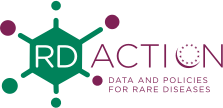Slovenia
Visual Recap
Contributor‘s names
Summary of Rare Disease Activities in Slovenia*
(Full report accessible below)
The National Plan for Rare Diseases (2012-2020) was confirmed and accepted by the highest medical consulting body, the Committee of Medical Healthcare at the Ministry of Health. The plan has no specific associated funding; however, the Ministry of Health has launched two relevant projects with dedicated initial funding: the National Contact Point for Rare Diseases, and the Platform for the National Registry for Rare Diseases. Notable successes of the Plan to-date include arrangement of annual national conferences for rare diseases and the launch of a rare disease website www.redkebolezni.si in August 2016.
Although there is no formal policy for the designation of Centres of Expertise for rare disease, 3 Health Care Providers currently participate in 9 different European Reference Networks. Regional rare disease-related registries exist in Slovenia, the oldest being the Cancer Registry of Slovenia (operational for over 50 years, with 90,000 patients registered). There is no national rare disease registry at present, although steps towards this have been taken (as above).
Neonatal screening is mandatory for two diseases, Phenylketonuria and congenital hypothyroidism. National legislation concerning genetic testing in Slovenia is currently being developed, and ll national laboratories are part of Orphanet database. All pre-symptomatic, predictive or prenatal genetic testing is performed with pre- and post-test genetic counselling.
Slovenia has developed national-level clinical practice guidelines (CPGs) for several rare diseases: there is a national polity for the development of CPGs for rare diseases but not at present for their adoption or implementation. Slovenia has a national Orphanet team and an information centre/national contact point for rare diseases, which includes a helpline service. The national alliance of rare disease patient organisations (Združenja za redke bolezni Slovenije) established in May 2015, has played a very active role in the organisation of annual activities to commemorate rare disease day.
As of October 2016, 39 Orphan Medicinal Products were available in Slovenia. There are measures in place to facilitate access to OMP for patients and also incentives for specific programmes to support research into and the development of OMPs.
Full 2016 Report on Rare Disease Activities in Slovenia
*NB – The findings and conclusions in this report are those of the contributors and validating authorities, who are responsible for the contents; the findings and conclusions do not necessarily represent the views of the European Commission or national health authorities in Europe. Therefore, no statement in this report should be construed as an official position of the European Commission or a national health authority.
Information supplied by the Slovenian SOA Data Contributing Committee:
- Competent National Authority – Mag Mojca Zeriav-Tansek
- Orphanet National Representative – Luca Lovrecic
- National Patient Alliance Representative – Tea Cernigoj Pusnjak and Mr Faganel





























